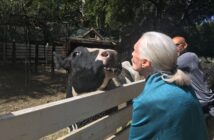This week marks the 29th Conference of the Parties to the UN Framework Convention on Climate Change in Baku, Azerbaijan, which continues until 22 November 2024. In recognition of this critical convening, the Jane Goodall Institute Global has issued the following policy statement.
The climate crisis is upon us as we approach COP 29. The urgency cannot be overstated. Forests are burning, oceans are rising, floods like those in Spain kill people, destroy properties, and create insecurity, and droughts in many parts of Sub-Saharan Africa increase conflict between people and wildlife for food and water.
The urgency of the climate crisis is further underscored by the convergence of three closely related crises. Studies indicate that we have less than a decade to prevent temperatures from rising more than 1.5 degrees Fahrenheit, a threshold beyond which the consequences would be catastrophic. This underscores the need for a global approach to tackle climate change, biodiversity loss, and environmental inequity. These crises, driven by human economic activities, are mutually reinforcing and have severe consequences for people and the ecosystems we depend on. They cannot be successfully resolved unless addressed together.
As representatives gather in Baku, the critical nature of the climate crisis is pressing and clear. It’s essential to accelerate progress in all aspects of the Paris Agreement, with a particular focus on financial commitments. The latest scientific findings and the results of last year’s significant first global stocktake underscore the need for increased finance, estimated to be 3 to 6 times the current level by 2030 to limit warming to below 1.5°C. At COP29, we anticipate the agreement on a new target for climate finance that meets the needs of developing countries, based on a new deal between developed and developing countries.
Climate change, biodiversity loss, and land degradation The COPs of the three Rio Conventions on Climate Change, Biodiversity, and Desertification will convene in 2024. This offers an exceptional opportunity for the COP Presidencies of the UNFCCC, CBD, and UNCCD and their respective Convention secretariats to collaborate on identifying and promoting concrete actions. These initiatives are called to boost collaboration across Conventions, create synergies, and effectively address the intertwined issues of climate change, biodiversity loss, and land degradation.
Wildlife trafficking, biodiversity loss and climate change Wildlife trafficking and habitat loss are leading causes of biodiversity loss, endangering many species and aggravating climate change. The Jane Goodall Institute’s years of research and conservation efforts have revealed that this is a complex global issue rooted in poverty, corruption, lack of enforcement, and the growing demand for exotic species. Education, awareness, local capacity, and resources are essential; however, we are running out of time. Political leadership is more necessary than ever, from high-level authorities of the countries’ source of illegally trafficked species to those at the point of destination and transit, as well as international agencies and social networks. Moreover, an updated global legal framework is needed to address this problem and its harmful impact on climate, biodiversity, public health, animal health, and the sustainable livelihood of Indigenous and local communities.
Climate change in Africa and environmental inequity In Africa, temperatures are rising faster than the global rate. Countries that have contributed least to greenhouse gas emission are facing disproportionate negative consequences of climate change. The frequency of droughts has nearly tripled in sub-Saharan Africa since 1979, and sea level rise along African coasts is faster than the global average, which contributes to increasing the frequency and intensity of coastal flooding and erosion. Desertification is threatening further land degradation and aquifer depletion. These impacts have severe consequences for local communities and the habitat of many species. One of the main problems caused by temperature increase is food scarcity. Food shortages threaten not only the people who depend on the productivity of their crops to generate income and nutrition but also the animals with which they share their environment. The increasingly frequent and prolonged droughts are causing a loss of vegetation, increasing the risk of fires, and threatening the habitats of many species, including chimpanzees.
African great apes The scientific community estimates that African great apes will lose between 84% and 95% of their current habitat by 2050 due to climate change, land use, and human population growth. That is why, in Africa and across the globe, the Jane Goodall Institute is tackling the issues of biodiversity loss, climate change, and environmental inequity with a holistic vision. Our Tacare community-led approach integrates Indigenous knowledge, scientific data, and innovative technologies with locally-owned decision-making processes and solutions. We work in partnership with local communities to facilitate and support sustainable initiatives that improve land use and combat deforestation, monitor landscapes of biodiversity significance, assess potential climate change effects on natural systems, integrate climate adaptation strategies, protect endangered wildlife, and take action to ensure a viable future for all life on Earth.
Chimpanzees and climate change The disappearance of forests due to land use and climate change threatens the survival of chimpanzees and other African primates. These endangered species are being displaced from their natural habitat, increasing encounters between people and wildlife. It is essential to take measures that reverse the causes of climate change and mitigate against the rise in human-wildlife conflict and future pandemics with the spread of zoonotic diseases.
The Jane Goodall Institute Global calls all Parties at COP 29:
- To significantly increase their ambition in cutting greenhouse gas (GHG) emissions, close the existing implementation gap, and immediately start phasing out all fossil fuels.
- To ensure that their new Nationally Determined Contributions (NDCs) are at the level of their highest possible ambition, fully aligned with the 1.5°C goal, and anchored, where possible, within national legislation and regulatory frameworks.
- To enhance their national adaptation efforts to implement long-term and transformational adaptation actions and to ensure the timely achievement of all the 2030 targets agreed to under the UAE Framework for Global Climate Resilience. Especially those focused on reducing climate impacts on ecosystems and biodiversity and accelerating the use of ecosystem-based adaptation and nature-based solutions.
- To establish an ambitious new collective quantified goal (NCQG) on mobilising climate finance to ensure adequate funding for climate action.
- To recognise the need for greater climate financing to flow towards high integrity nature-based solutions for adaptation and mitigation, and, mainly, for significantly increased funds to be made more easily and directly accessible to Indigenous peoples and local communities, noting that they are presently the custodians and stewards of the world’s most intact ecosystems, including over a third of the world’s remaining irrecoverable carbon
- To ensure the highest levels of environmental and ecosystem integrity in the operationalisation of Article 6 of the Paris Agreement concerning the carbon market mechanisms implemented around the world
- To promote and implement inclusive and equitable climate policies and actions that incorporate the core priorities, concerns, needs, and rights of the most vulnerable, particularly Indigenous peoples, women, youth, and children, and to ensure their full and meaningful participation in all UNFCCC processes.
- To private and financial sectors to establish, implement and transparently disclose ambitious corporate policies and measures that are GHG emissions neutral, nature positive and socially just, and directly contribute to the 1.5°C goal and to the effective implementation of NDCs in the jurisdictions where they operate.
The Jane Goodall Institute Global calls on all Participants to COP 29 to transform the commitments made in the UAE Consensus at COP28, such as tripling renewable energy, achieving the global adaptation goal, and moving away from all fossil fuels, as well as the financial means to achieve these goals, to tangible, real-world outcomes safeguarding people and their livelihoods globally. The climate emergency is not just an isolated environmental issue; it has become a systemic, existential threat to all life.
Globally, the Jane Goodall Institute operates in more than 30 countries where we are dedicated to tackling the most pressing biodiversity challenges and fostering environmental leadership. Our youth-led Roots & Shoots program highlights the intergenerational inequity, as children and young people today will be most impacted by the devastating effects of climate change and biodiversity loss in the future if we fail to act now.

References:
- Welcome to the official website of the UN Climate Change Conference Baku—COP29, 11 to 22 November 2024.
- An Urgent Call for an Integrated Approach at COP28, The Jane Goodall Institute Global, 2023
- IUCN position paper for UNFCCC COP29 United Nations Framework Convention on Climate Change Twenty-ninth session of the Conference of the Parties (COP29)11 – 22 November 2024, Baku, Azerbaijan
- The Paris Agreement, COP21, Paris 2015
- Shah, M.A.R., Orchard, S., Kreuzberg, E., Braga, D., Das, N., Dias, A. , Kandasamy, K., Kibria, A. SMG., Kumar, Min, W. W., Pandey, P., Rais, M., Sahay, S., Saikia, P., Scozzafava, S., Sharma, S.B., Swamy, SL., Kumar Thakur, T., Vasseur, L., & Andrade, A. (2024). “Climate mitigation and biodiversity conservation: A review of progress, key issues in global carbon markets, and potential impacts on ecosystems”. Gland, Switzerland: IUCN. 2024






